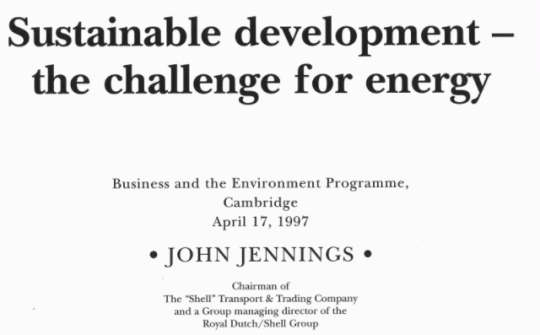This document is a presentation at the “Business and the Environment Programme” by John Jennings, a Shell Managing Director and Chairman of Shell Transport and Trading Company. Part of a larger collection discovered by Jelmer Mommers of De Correspondent in a trove of internal Shell documents, this presentation shows the discord within Shell, as some parts of the company internalized climate science consensus, while others, like Jennings, continued to stress uncertainty.
Focusing on the Brundtland Commission’s three pillars of sustainable development (i.e. wealth creation, social development and environmental sustainability), Jennings outlines Shell’s plans moving forward using Shell-made scenarios. Jennings acknowledges that burning fossil fuels and emitting CO2 may have a future effect on the climate but “as a geologist,” he writes, “I am well aware of the natural viability of climate – within historical periods as well as geologic timescales.” He continues, “Man-made carbon dioxide is only a small fraction of the flux in natural systems. I believe that we are still not in a position to know whether any effect will be good, bad, or indifferent, whether it will be lasting, or whether the earth’s natural processes will restore stability.”
Taking specific issue with the Intergovernmental Panel on Climate Change’s (“IPCC”) future CO2 emissions predictions, Jennings argues that the IPCC isn’t taking into account the inevitable, free-market shifts in the energy sector, leading to less fossil fuel consumption. Focusing again on economics, Jennings stresses the importance of securing sustainable energy for the future by maintaining a steady supply of cheap fossil fuels. While advocating for future use and reliance on fossil fuels, Jennings admits he has “little doubt that – with enormous supplies of energy available in nature – future historians will see our present means of meeting our energy needs as a primitive phase.”
Interested in more Shell documents? Full index here.


